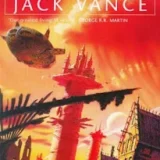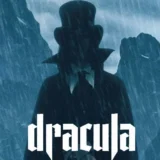While conducting exploration in the frozen Arctic, Texan Lew McCardle, a geologist working for the Houghton Oil company, discovers something remarkable: the body of a Roman gladiator encased in ice. Miraculously brought back to life, now the warrior Eugeni must readjust to this new world, with its bizarre customs, hidden traps, and moral complexities, as he struggles to come to terms with painful memories of loves and glories lost, bloodthirsty politics and heartbreaking betrayals.

CHAPTER I
Blechhh,” said the tool pusher entering, about half a coffeepot of drinking after the drill had stopped two hours earlier in the day. “It’s awful. We put it in one of the unheated domes, the windbreaker. I don’t want that thing melting. It’s weird. Did you see it?”
“What you dug up?”
“Yeah. Blech,” said the tool pusher, shaking his head and making sounds as though he were clearing a taste from his mouth.
“No,” said Lew. “I didn’t see it, and I don’t want to see it. There are two things I want, tool pusher. I don’t want to have anything to do with what you dug up. That’s immediate. Long-range, like five weeks maximum, I want to retire with my pension money.”
“It was a body, Lew. It was a man …” said the pusher. And then pausing, “Once.”
McCardle withheld his answer. “You don’t want to know about it, right?” asked the tool pusher. Lew knew he wanted some comment, some explanation, for the body that had been found and whatever condition it was found in. Just a body did not cause that sort of revulsion in a tool pusher, least of all an experienced one who had been around oil fields.
“That’s right,” said Lew McCardle.
“OK,” said the tool pusher.
The body, as Lew found out, was small. A little fellow. Just about five feet tall. But what had unnerved the crew, according to the derrick man and a couple of roustabouts, was that the little guy was nude.
“Bare as a babe in afterbirth,” said one.
“The core tube took out a piece just under his ass. From the thigh,” said another.
The body was christened Charlie and remained in the windbreaker dome for a week, as the drill bit went into the first layers of earth. A duplex pump had to be winched out of the windbreaker dome, and a variation of a bull-nosed reamer bit, for rotary, had to be installed. But two roughnecks dropped the pipe string, which shattered in a cold that made metal as brittle as porcelain. And that was another delay. The drilling was not going well.
“We snaked it out with a catline,” the tool pusher told McCardle later, referring to how the shattered pipe string was removed from the hole.
Lew nodded.
“We got a boll weevil,” said the pusher, referring to the newness of the superintendent. “I’ve never seen one this green at an isolated site.”
“This kind of weather is not good for that kind of talk,” said Lew finally. “This kind of weather doesn’t tolerate much.”
“Well, rockhound, what do you say?”
“I say it’s pretty sloppy, dropping a dead line anchor. You know everything becomes more brittle at these temperatures.”
“Ceptin’ Charlie in the shed. You know he didn’t grow no beard.”
“I’m not his barber,” said Lew.
“Well, dead men’s beards grow. Charlie’s didn’t.”
“They grow because the hair follicles are alive after the body is dead. But this body was eight point two meters down in ice.”
“But hair can grow through ice.”
“Low temperatures reduce and sometimes stop physical action. That’s why you found him with his skin on.”
“You think so?”
“If we hit Charlie somewhere in an Indonesian jungle, you wouldn’t have even found the bone.”
“But how did he get here without clothes on?”
“I don’t know.”
“We’re two hours by snowmobile to an air base. How did he walk here nude? And don’t tell me he strolled there in the summer, ’cause this shit is permanent up here.”
“Nothing is permanent,” said Lew.
“How did it get here, rockhound?”
“Tool pusher, ice moves.”
“All the way up here?”
“It’s been there a long time.”
“We shouldn’t have dug it up.”
“You didn’t ask me then.”
“Yeah. Well. We should have let Charlie stay.”
“You’ve got jackhammers. You can put him back.”
“We can’t do that now. You wouldn’t say that if you saw him. I’ve seen bodies, Lew. They’re meat. This one is just—just—. We can’t put Charlie back. None of us would go for that.”
Lew’s cot was in the laboratory. At one of the inner chambers of the laboratory dome at the side was the downhole tester he had put together himself. It measured the pressure of existing conditions. It was very important. As Lew lay down at the prescribed time for sleeping—you had to sleep by the clock when you didn’t have the sunrise and sunset—he noticed part of the downhole tester was under his cot, and he hadn’t put it there.
When the superintendent came in later for his twice-daily geological discussion, Lew mentioned this.
“You’re lucky. These bimbos have gone through tools lately like Cracker Jacks. You’ve got yours. Charlie has cursed this site. He has, Lew. I don’t believe in ghosts or anything, but Charlie’s spirit is ruining this. Charlie is ruining my career.”
Two nights later, Lew woke up in terror and he didn’t know what had terrified him. He looked around the lab, and everything seemed to be all right. The lab smelled somewhat ripe, of course, and undoubtedly it would be even worse if he had gotten some fresh air and entered it new. But that was normal. Something was incredibly wrong. He didn’t know what it was, but it was wrong. His feet sweated in his sleeping socks and his stomach curdled and tightened, and then he realized the drill had stopped.
And he was awake. The sound had been the constant background humming; the drone coming up through the floor had started as annoying and had become necessary as his body had adjusted to normal feelings. Now it was stopped. The silence had wakened him.
Two A.M. And it was stopped. Lew got an interdome line working and finally reached someone. There had been an accident, a serious one.
Somehow the drill got working two minutes and forty-three seconds later, but the superintendent, his ferret face strained with deep, dark circles under his eyes, came to Lew and said they had to get Charlie out of the site.
“Nobody’s sending in a plane here,” said Lew. “You’ve got that John Deere up here with the plow in the windbreaker to push the ice and snow back over everything if we drill in. They don’t want some pilot getting locations over the air. That’s why we drove this stuff in, everything.”
“Lew. You’re just a geologist. Stay that way. You’re not getting paid enough to worry about that.”
“I agree,” said Lew McCardle.
“Can you get the body out of here?”
“You want your geologist to leave? You want your rockhound off site?”
“Yes.”
“We’ve got roughnecks. We’ve got roustabouts. That’s what they’re for. They should get rid of it.”
“They won’t go, Lew. Maybe you’d better not look at the body either.”
“Do you want me to take this body away from the project and bury it somewhere?”
“No. Totally away. Go to the air base. Snowmobile it away at noon. There’s the best light then. Take it to the air base.”
“I can’t show up at an air base with a body unexplained,” said Lew.
“Keep it in its tarp. The crew says you know some doctor who can use parts and stuff, frozen.”
“You’re talking to the crew again. Well, that’s good. But I want a signed document ordering me to leave the base. I need it. This is my retirement. I’ve put in a lot of consecutive years without vacations to get this. I can’t walk off my last site without a signed and witnessed document.”
“You got it, McCardle.”
And so shortly before noon, Lew dressed for the cold. He put the document, signed and witnessed, against his chest under the long johns, and nylon socks under wool socks, and a sweater over the long johns, and pants over the long johns, and nylon outer pants over the pants, and the arctic boots over the socks, and two layers of gloves, and a head mask, and wool head pullover, and a jacket with a head covering over all of that. Then he left the lab and made his way with the tool pusher, driller, and others following.
Inside the windbreak dome they pointed to Charlie. It was a tarpaulin-covered mound resting on an Akron-fresh rubber tire, with cleats so sharp and new they looked as though they could cut paper. Above the reddish brown tarpaulin, white frost had formed on a strut. Many had breathed there recently, Lew observed. Their breath had made the frost. There had been a lot of looking.
A floodlight with an unmerciful glare made Lew feel he was entering some strange precivilized temple of a hostile god—its incense, heavy motor oil; its altar, the tire; its object resting on top. The tool pusher flipped open the tarpaulin, and Lew saw what had upset them so much.
In a mound of blue gray ice, a body on its side was running. He could see the black hair and large clear sections of white skin. Its left arm in front, its right arm in back, left leg forward, right leg in back, it appeared to be running. It was running. It was running, thought Lew. It was running and someone had stopped it. Like a movie frame it had been stopped.
Its right rear thigh had the smooth even borehole through the outer flesh. It was the only smooth cut on the dark blue mass before Lew’s eyes. He circled to the front of the body.
Its eyes were closed. Its mouth open. There was the tongue. Dead tongue in a dead mouth, yet so clearly seen. It appeared to be praying. The left arm in front appeared to be asking for something. It was nude all over. Bare as a baby. Yet muscular. And little.
The little fellow was so small Lew’s arms could stretch from head to toe.
“What do you think, Lew?” asked the tool pusher.
“I think Charlie isn’t Jewish,” said Lew.
There was a short, brave laugh at this witticism about the penis not being circumcised. Of course, it also meant that Charlie was probably not born in an industrialized society where circumcision was now practiced for sanitary reasons.
“You wonder where he was running to when he was froze like that,” said the tool pusher. “Like he was headed somewhere and he was stopped. Is that what you’re thinking?”
“The ice will make him too heavy for the back seat,” said Lew. “We’ll have to sled him behind my machine.”
He wanted to start right away, while he had that brief hole of light. He was fairly certain he would reach the air base with no trouble if he took precautions. But this was not an American interstate road. If he made mistakes, if he got careless now or panicked driving off in some desperate direction, there could be two solid corpses up here.
“Good-bye, Charlie,” said the tool pusher as they strapped the tarpaulin cover to a sled hitched to the snowmobile. Lew patted his chest, feeling the paper against his breast. This was his last site in twenty-five years. He didn’t say good-bye to the men.
###
 Richard Ben Sapir’s The Far Arena is now available from Open Road Media, as are many other fine science fiction, fantasy and horror e-books
Richard Ben Sapir’s The Far Arena is now available from Open Road Media, as are many other fine science fiction, fantasy and horror e-books
Read My Profile









